Friday, November 9, 2012
Wednesday, November 7, 2012
Lang Lang / Christoph Eschenbach piano recital at the Kennedy Center

|
Much more sensible review in the WP than the one for the previous recital. Indeed, “Eschenbach projects a kind of monkish restraint, but he may actually be the more flamboyant, the more emotional of the two. Lang Lang is certainly given to big gestures, but there's also a solid through line, where Eschenbach can be episodic.” “The performance was certainly a heartfelt exchange between two musicians, playing on two equal instruments, facing each other.”And that was strange: while “For Two Pianos” means just that, “For Four Hands” implies sharing the keyboard of the same instrument. Yet, it was only at the very end, with the Debussy encore, when the two musicians actually played on the same piano. Midgette, A., Coming to appreciate Lang Lang, Washington Post, November 8, 2012. |
|

|
Friday, March 11, 2011
Turangalîla-Symphonie with the NSO

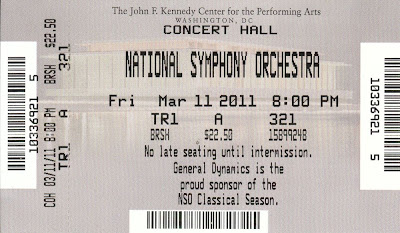
|
D. C. public is so funny: the Kennedy Center Concert Hall was half-empty when the NSO performed Olivier Messiaen's Turangalîla-Symphonie on Friday evening, and there was quite a few walk-outs. I can't believe that music written in 1948 still seems “avante-garde” to some. Turangalîla-Symphonie is stylistically eclectic: it somehow combines Wagnerian exaltation of mysterious love and Brucknerian seriousness of naive religiosity with the Bernsteinian energy and openness of emotion, plus an almost literal descriptiveness redolent of film music. And yet, all this, quite mysteriously, jells together and works, perhaps due to the Messian's sincere Catholic faith. It was a joy to see two soloists working together so well: Cédric Tiberghien (piano) and Tristan Murail, who studied with Messiaen (ondes Martenot). Christoph Eschenbach definitely deserves credit for programming this piece. Ponick, T. (2011), Where Messiaen and Radiohead converge, Washington Times, March 10, 2011. |
Friday, March 4, 2011
Zakir Hussain and the NSO
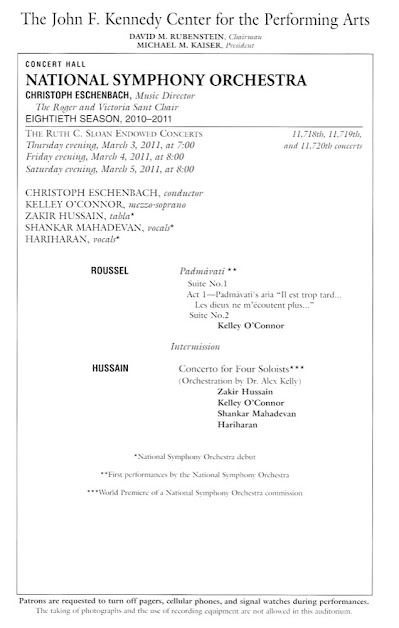
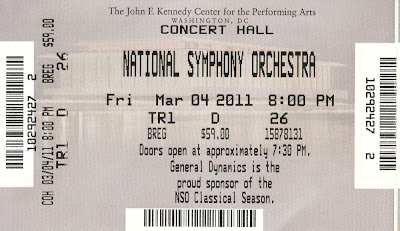
|
Midgette, A. (2011) Crossover: NSO goes to India, The Classical Beat, March 4, 2011. Midgette, A. (2011) NSO review: Tabla meets West as ‘India’ concert strikes a crossover convergence, Washington Post, March 4, 2011. |
Friday, January 28, 2011
Berg and Beethoven with NSO/Eschenbach
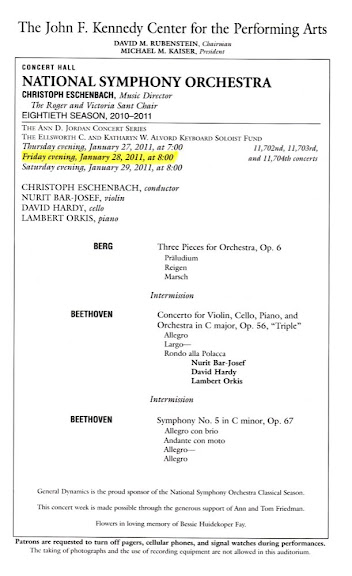
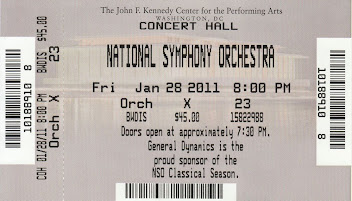 What a difference a program makes! After the flop with an all-American program, it was so wonderful to hear the all-Viennese one today! The Berg pieces, infused with the sense of foreboding, sounded so fresh as if they were written today. Beethoven's Triplekonzert was something of a disappointment though: in my mind's ear I was hearing the famous Oistrakh/Rostropovich/Richter/Karajan recording with the Berlin Philarmoniker, and even though Lambert Orkis and Christoph Eschenbach were excellent, David Hardy is by no stretch is a Rostropovich; and Nurit Bar-Josef, as nice as her violin sound is, is no Oistrakh.
What a difference a program makes! After the flop with an all-American program, it was so wonderful to hear the all-Viennese one today! The Berg pieces, infused with the sense of foreboding, sounded so fresh as if they were written today. Beethoven's Triplekonzert was something of a disappointment though: in my mind's ear I was hearing the famous Oistrakh/Rostropovich/Richter/Karajan recording with the Berlin Philarmoniker, and even though Lambert Orkis and Christoph Eschenbach were excellent, David Hardy is by no stretch is a Rostropovich; and Nurit Bar-Josef, as nice as her violin sound is, is no Oistrakh. Eschenbach's take on the Beethoven's 5th was very fresh: the dynamic ranges (ppp/fff, crescendo/diminuendo) was wide, the tempi were unusually fast, and even though he is often criticized for an episodic approach and lack of architectural vision, the symphony's progression from one movement to another seemed logical, and it felt like a unified work.
What he needs to work on, it seems to me, is achieving timbre distinction, juxtaposition, and contrast of various orchestral groups, so that the stringed, the woodwinds, and brass would all have their own distinct sound quality, like what one can hear with Amsterdam Concertgebouw under Haitink and Jasons, Leningrad Philharmonic under Mravinsky, or Philadelphia Orchestra that Eschenbach himself used to lead. In fairness though, acoustics of the Kennedy Center Concert Hall are so bad that some of the sound quality may have been simply dampened or distorted. Yet, what Eschenbach has achieved in his short tenure at the NSO is quite impressive.
Midgette, A., Concert review: Christoph Eschenbach showcases National Symphony Orchestra 'family', Washington Post, January 28, 2010.
Monday, January 24, 2011
Bernstein and Gershwin with NSO/Eschenbach and Barto
Tzimon Barto (once upon a time, just plain Johnny Barto Smith, Jr., from a town near Orlando) is a body-building, multi-lingual, novel-writing keyboard artist who has a long association with Eschenbach in concert halls and recording studios. The conductor hears in the pianist more qualities than some of us do.
I found myself mostly frustrated [...], first by the incredibly slow tempos that kept overriding Gershwin's own energetic pulse; and then by Barto's playing. There were flashes of bravura and of intriguing poetic nuances, but there wasn't quite enough technical dazzle or richness in tone to keep things fully interesting.
Smith, T., National Symphony marks JFK anniversary with new Lieberson work, Baltimore Sun, January 23, 2011.The pianist apparently thinks of the concerto as Gershwin's attempt to out-do Rachmaninoff, an approach Eschenbach embraced with a conviction you had to admire. I'm far more open to extremes than many of my colleagues, and I really wanted to buy into this exercise in elongation, this search for profound depths amidst the Charleston rhythms, but I just kept missing the guy I recognize as Gershwin.
Saturday, September 25, 2010
NSO Season Opening Concert at the Kennedy Center
Washington, D. C., has been fortunate enough to get Christoph Eschenbach as a new Music Director of the Kennedy Center and of the National Symphony Orchestra. I was really looking forward to attending his inaugural concert, and invited Wanchuk to share this important experience with me. He had planned to go hang-gliding this day, and also he had offered me to go along, and I said I would. Throughout the years I have learned not to plan two major events for one day but we were going to leave the training grounds earlier to have enough time to make it to the 7pm concert.
Everything was going well: Wanchuk had a few good flights, while I was snapping pictures and videos, and in-between jotting down notes for the paper I was about to start writing. The wind was gusty and shifty. I went far into the field to record Wanchuk's last flight for the day. He launched, and on the camera screen I saw the glider making a sudden sharp left turn. Before I knew it he landed on a tree.
When I walked up to the tree I saw Wanchuk hanging upside down a few feet above the ground, struggling to free himself from the harness attached to the glider by a carabine. I know it was a serious, potentially life-threatening accident but I couldn't help chuckling because the situation reminded me a scene from a French movie I watched when I was a boy: Perched on a Tree with the great Louis de Funès.

After a few attempts Wanchuk managed to slip out of the harness and get to the ground—shaken but otherwise unhurt, save for a few scratches. Given the shock of what he had just been through, however, it was not at all clear that he would be able to drive back, much less make it to the concert. Yet, in a few minutes he managed to pull himself together. Not only did he drive us back to town but he also drove to the Kennedy Center, and we were there two minutes before the start of the performance!
The NSO Season Opening Concert is a big social event in D. C.—it was fun to watch the public in evening dresses, tuxedos, and even formal kimonos. The program featured two pieces by Johann Strauss Jr., “Four Last Songs” for soprano and orchestra by Richard Strauss, with Renée Fleming, and Liszt's Piano Concerto No. 1, with Lang Lang. Eschenbach took some liberties with the Johann Strauss's tempi but the orchestra sounded bright and lively. In Richard Strauss's songs Eschenbach elicited from the orchestra lush, rich sound, with complex harmonies saturating the air.
Wanchuk later said that he liked the Strauss a lot but Fleming's voice was a little flat and did not soar over the orchestra, which is exactly how it was. You gotta admire the guy: with no background in classical music, to like Richard Strauss(!), of all composers, and to make such a perceptive remark—all that just a few hours after having a pretty dangerous accident! He likes stitching together different worlds/scenes though, like being out in the field hang-gliding one hour, and wearing suit and tie at the Kennedy Center Gala the next.
Before we entered the Concert Hall I ordered a glass of champagne to pick up during the intermission. Imagine my surprise when, upon exiting the Hall after the first segment, we found tables groaned with wine, champagne, and sparkling water! The Brute I ordered was better than the free champagne though…or, at least, I'd like to think so.
Lang Lang's Liszt was excellent; in fact, every time I see Lang Lang I find that his playing gets better and better. For an encore, sitting side by side at the grand piano, Eschenbach and Lang Lang played two pieces from Debussy's “Petite Suite”—that was great.
The concert was followed by Opening Ball (by invitation only). Since there was nobody checking invitations, we decided to check out what was going on and ended up crashing a pre-dinner reception. I am not a big fan of white wine but I must admit that the one served there was exceptionally good.

Ended the evening with a dinner with Wanchuk and Matt at the Slaviya restaurant in Adams-Morgan: great Balkan food but unbearably loud techno music.
Read Wanchuk's blog entry.






